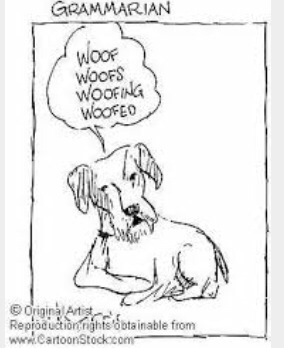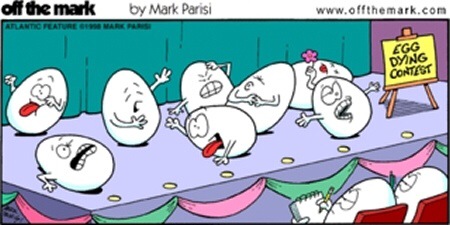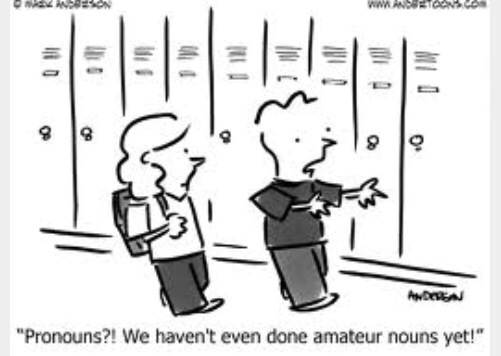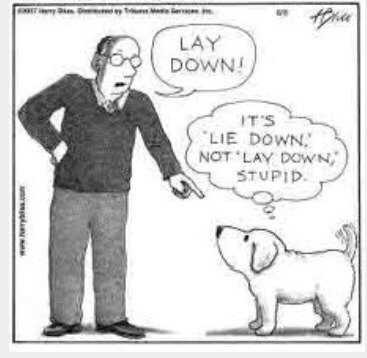Archiv für den Monat: April 2014
Break
Inspiration
Hey Guys and good morning everyone,
you are doing a great job up to now. Keep up the work on your articles and proofread others. Try to be specific, but also to be polite and positive with your feedback.
Here is just some inspiration for you in order to make your article more concrete or catchy. Try to google terms such as ‘graphic grammar’, ‘grammar cartoons’ or ‘grammar comics’ plus your topic. You will find at least something to laugh about, if not a few ideas of how to improve
Ex 1: Make a little fun to increase attention
Ex 2: show that grammar is so productive that you can use it with any made up word

(We did that at the blackboard, remember?)
Ex 3: ‘real’ grammar cartoons to a certain topic
Keep up the good work
Cheers
Mr. Bissinger
Plural
The Plural

Example: I have a mobile phone, but my brother has two mobile phones.
Jessi has a dog, but Julia has two dogs.
Irregular
| Singular | Plural |
| a man | two men |
| a woman | two women |
| a child | two children |
| a mouse | two mice |
| a tooth | two teeth |
| a goose | two geese |
| a foot | two feet |
| a fish | two fish |
® Made by Jessi and Laura
He, She, It
he, she ,it
He, she and it are personal pronouns, if you conjugate a verb with this personal pronouns, you have to add an -s at the end of the verb.
Ex:She likes to play football.
You can learn that, with a little easy sentence.
He, She, It das -s muss mit!= He,She,it the -s must fit!
Made by Karina+Johanna+Melanie
SVO
At the beginning is the SUBJECT, than the VERB and than the OBJECT (SVO).
The second rule is place in front of the time.
- Eg: Adam saw a dog in front of the church, yesterday.
- but the time can be stand in the front of the sentence or at the end of the sentence Yesterday, Adam saw a dog in front of the church.
- QUESTIONS
- The questions have to build with do/does/did.
- Eg: Do you saw a dog in front of the church, yesterday?
- If you can take a questionword like how?what?who?where?… you have to put it in front of the senence.
- Eg: Where did you see the dog, yesterday?
Made by Melanie and Johanna ![]()
adjectives and adverbs
Star-Wars themed
The Star-Wars fighters are dangerous. (gefährlich) ->adjective
They are fighting dangerously. ->adverb
The difference between an adverb and an adjective is pretty easy and we bet you already noticed it while reading the example senteces above. But when to use which form?
Adjective: As you already know, an adjective describes the thing or the person (marked orange) in the sentence that is doing something. (For example: The Star-Wars fighters are dangerous.<-The adjective `dangerous` is describing the Star-Wars fighters.
Adverb: On the other hand, an adverb describes the action (how the person or the thing is doing) in the sentence (marked orange). (They are fighting dangerously.) You built it with whichever adjective you like, and add `ly`as an ending. But unfortunately there are some irregular forms of adverbs…
1. some adjectives, like `hard` don´t need the `ly`to become an adverb. (adjective: John is a very fast runner. Adverb: John runs fast.)
2. If the adjective has an `y`at the end, like happy, the `y` turns into an ‘i`and the `ly`is added normally to the adjective: (happy -> happi -> happily)
3. good -> well – In some cases the adverb of the verb is something totally different.
Exercise: Choose the adjective or the adverb in the following sentences.
1. Yoda always stands really (calm/calmly), except when he is fighting.
2. Princess Leia is (beautiful/beautifully).
3. The (amazing/amazingly) Starwars series is loved by many fans all over the world.
Answers: (read from the right to the left)
1. ylmlac
2.lufituaeb
3. gnizama
Articles
In the English language, the definite article is “the” (der, die, das) and the indefinite articles are “a“ or “an” (ein, eine).
Use:
The article “the” is used for stuff or other nouns which you know. You only can use the indefinite article “a“, when the word after the indefinite artcle begins with a consonant for example b. The indefinite article “an” can only be used, if the noun or adjective after the article begins with a vowel for example a or it sounds like a vowel. The indefinite article can be used for stuff or nouns which you don’t know how it looks like. You can’t use the article for names for example “God”. Weiterlesen
Capital Letters
Gerund
You form the gerund with the infinitive form of the verb and -ing at the end of the verb.
Examble:Going to parties is fun. I enjoy reading.
The verb with the gerund form stands after prepositions.
Example:
|
After some special verbs stands only the verb with the gerund form.
Special verbs: admit, avoid, carry on, consider, delay, deny, dislike, can’t help, enjoy, finish, give up, imagine, include, involve, justify, keep (on), mention, mind, miss, practise, regret, risk and suggest.
Example:
| admit | He admitted having driven too fast. | Er gab zu, zu schnell gefahren zu sein. |
| avoid | Theyavoid going on holiday on Saturdays. | Sie vermeiden, an Samtagen in den Urlaub zu fahren. |
| carry on | If we carry on sleeping so badly, we may need help. | Wenn wir weiter so schlecht schlafen, werden wir Hilfe brauchen. |
| consider | Ralph is considering buying a new house. | Ralph denkt darüber nach, ein neues Haus zu kaufen. |
| delay | I delayed telling Max the news. | Ich verschob es, Max die Neuigkeiten zu erzählen. |
| deny | She denies reading the book. | Sie lehnt es ab, das Buch zu lesen. |
| dislike | We dislike reading poems. | Wir mögen das Lesen von Gedichten nicht. Wir mögen es nicht, Gedichte zu lesen. |
| can’t help | He couldn’t help falling in love with her. | Er konnte nicht anders, als sich in sie zu verlieben. |
| enjoy | I enjoy playing chess. | Ich genieße es, Schach zu spielen. |
| finish | They finished working in the garden. | Sie haben aufgehört, im Garten zu arbeiten. |
| give up | Susan gives up playing ice-hockey. | Susan gibt das Eishockeyspielen auf. |
| imagine | He imagined driving a new car. | Er stellte sich vor, ein neues Auto zu fahren. |
| include | Your responsibility includes taking reservations on the phone. | Deine Aufgabe beinhaltet, Reservierungen am Telefon entgegen zu nehmen. |
| involve | The project will involve growing plants. | Das Projekt wird auch Pflanzenanbau betreffen. |
| justify | I cannot justify paying $100 for this ticket. | Ich kann es nicht rechtfertigen, 100 Dollar für die Eintrittskarte zu bezahlen. |
| keep (on) | They keep on running. | Sie rennen/laufen weiter. |
| mention | Did Alex ever mention playing baseball? | Hat Alex schon erwähnt, dass er Baseball spielt? |
| mind | I don’t mind sleeping on the couch. | Ich habe nichts dagegen, auf der Couch zu schlafen. |
| miss | They miss playing with their friends. | Sie vermissen es, mit ihren Freunden zu spielen. |
| practise | She practised playing hockey. | Sie trainierte das Hockeyspielen. |
| regret | Do you regret having mentioned it? | Bedauerst du, das erwähnt zu haben? |
| risk | You risk catching a cold. | Du riskierst, dich zu erkälten. |
| suggest | She suggested flying to Cairo. | Sie schlug vor, nach Kairo zu fliegen. |
After some expressions stands only the verb with the gerund form.
Special expressions:to be busy, couldn’t help, don’t mind, feel like, how about, it’s (no) good, it’s no use, spend one’s time, there’s no, there’s no point, what about and worth.
Example:
| to be busy | He is busy reading the paper. | Er ist gerade dabei, die Zeitung zu lesen. |
| couldn’t help | She couldn’t help eating another apple. | Sie musste einfach noch einen Apfel essen. |
| don’t mind | I don’t mind telling them my opinion. | Es macht mir nichts aus, ihnen meine Meinung zu sagen. |
| feel like | We feel like having a cup of tea. | Uns ist nach einer Tasse Tee. |
| how about | How about walking home instead of taking the car? | Wie wäre es mit Heimlaufen, statt mit dem Auto zu fahren? |
| it’s (no) good | It’s no good talking to this girl. | Es hat keinen Zweck, mit dem Mädchen zu reden. |
| it’s no use | It’s no use talking to the headmaster. | Es hat keinen Sinn, mit dem Schulleiter zu sprechen. |
| spend one’s time | They spend their time reading. | Sie verbringen ihre Zeit mit Lesen. |
| there’s no | There’s no cheating anymore. | Es gibt kein Mogeln mehr. |
| there’s no point | There’s no point in complaining further. | Es ist zwecklos, sich weiter zu beschweren. |
| what about | What about going to the zoo? | Wie wäre es mit einem Zoobesuch? |
| worth | The book is worth reading. | Es lohnt sich, das Buch zu lesen. |



